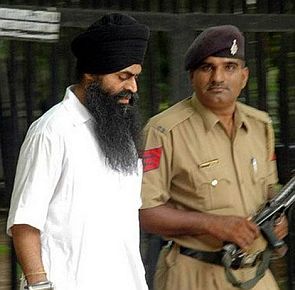 The Supreme Court on Monday commuted the death sentence of 1993 Delhi bomb blast case convict and Khalistani terrorist Devinderpal Singh Bhullar to life term on the ground of delay in deciding his mercy plea and his medical condition.
The Supreme Court on Monday commuted the death sentence of 1993 Delhi bomb blast case convict and Khalistani terrorist Devinderpal Singh Bhullar to life term on the ground of delay in deciding his mercy plea and his medical condition.
A four-judge bench headed by Chief Justice P Sathasivam granted life to Bhullar on the ground of delay on the part of the government in deciding his mercy plea and also on the basis of his present medical condition.
The bench, also comprising justices R M Lodha, H L Dattu and S J Mukhopadhaya, passed the order on a curative petition filed by Bhullar's wife Navneet Kaur.
She pleaded before the court to relook into its verdict, in which Bhullar's plea for commuting the sentence was rejected, in view of its recent judgement where it was held that delay in deciding mercy plea can be a ground for commutation of death penalty.
Bhullar was convicted and awarded death penalty for triggering a bomb blast in New Delhi in September 1993, which killed nine persons and injured 25 others, including then Youth Congress president M S Bitta.
The Centre had earlier on March 27 told the court that it had no problem with commutation of Bhullar's death sentence to life term.
It had said that the petition in this regard has to be allowed in view of the court's January 21 verdict that delay in deciding mercy pleas can be a ground for such relief.
The bench had on January 31 stayed Bhullar's execution and had agreed to review its judgement by which it had rejected the 1993 Delhi bomb blast convict's plea to commute his death sentence to life term.
It had issued notice to the Centre and Delhi government on a curative petition and had also directed the Institute of Human Behaviour and Allied Sciences (IHBAS), where Bhullar is being treated, to file a medical report on the condition of the death row convict who is alleged to be suffering from mental illness.
The Apex court had on January 21 said that inordinate and inexplicable delay by government in deciding mercy plea of death row convicts can be a ground for commuting their sentence.
The Apex court had on March 26, 2002 dismissed Bhullar's appeal against the death sentence awarded by a trial court in August 2001 and endorsed by the Delhi High Court in 2002.
He had filed a review petition which was also dismissed on December 17, 2002. Bhullar had then moved a curative petition which too had been rejected by the apex court on March 12, 2003.
Bhullar, meanwhile, had filed a mercy petition before the President on January 14, 2003.
The President, after a lapse of over eight years, dismissed his mercy plea on May 14, 2011. Citing the delay, he had again moved the apex court for commutation of the death sentence but his plea was rejected.
The Apex court on January 21 had held inordinate delay by government in deciding mercy plea of death row convicts can be a ground for commuting their sentence and had granted life to 15 condemned prisoners including four aides of forest brigand Veerappan.
In the landmark judgement, the court had held that prolonging execution of death sentence has a "dehumanising effect" on condemned prisoners who have to face the "agony" of waiting for years under the shadow of death during the pendency of their mercy plea.






 © 2025
© 2025